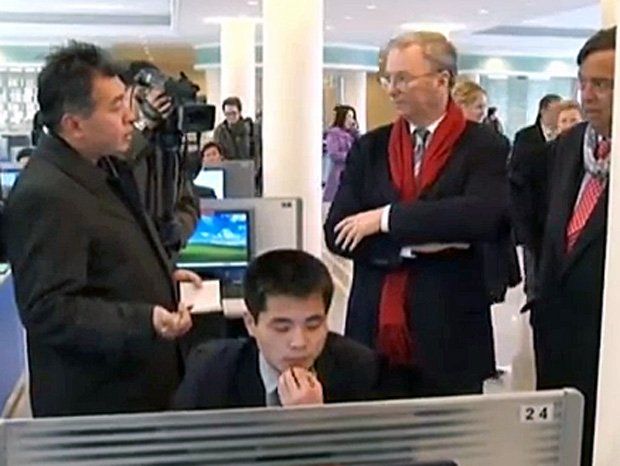
Google Executive Chairman Eric Schmidt’s daughter Sophie has posted a lengthy account with photos of their recent trip to North Korea. She describes deep government control of the nine-person delegation’s visit and North Korean citizens’ access to technology and information, as well as extreme cold and the mysterious availability of Doritos snack chips in one supermarket visited.
Some highlights:
– The English-language customs form for North Korea requires declaration of ”killing device” and “publishings of all kinds.”
– None of the buildings visited by the delegation was heated, despite the cold. Sophie writes: “They’re proudly showing you their latest technology or best library, and you can see your breath. A clue to how much is really in their control.”
– The delegation had two official minders always present with them (“2, so one can mind the other”) and no interaction with North Koreans not vetted by officials.
– Eric Schmidt’s “reaction to staying in a bugged luxury socialist guesthouse was to simply leave his door open.”
– The group saw a room with roughly 90 North Koreans at computers in the Kim Il Sung University e-Library. But, Sophie writes, “One problem: No one was actually doing anything. A few scrolled or clicked, but the rest just stared.”
– The group could make international calls on rented cell phones but had no data service.
Eric Schmidt (who confirmed to Quartz that his daughter penned the account) separately posted comments about the trip. Among them are some details about the technology available to North Koreans. Schmidt writes:
There is a 3G network that is a joint venture with an Egyptian company called Orascom. It is a 2100 Megahertz SMS-based technology network, that does not, for example, allow users to have a data connection and use smart phones. It would be very easy for them to turn the internet on for this 3G network. Estimates are that are about a million and a half phones in the DPRK with some growth planned in the near future.
Schmidt is co-writing a book due out on April 23 that discusses what it means for billions of people around the world to have “almost unlimited access to all of the world’s information.” His post says that the US delegation he was part of made ”very, very clear” to North Korean officials that they will continue to lag economically unless they open up internet access. Schmidt writes: “Once the internet starts in any country, citizens in that country can certainly build on top of it, but the government has to do one thing: open up the internet first.”
Quartz earlier posted photos of Schmidt looking at things during the trip.



